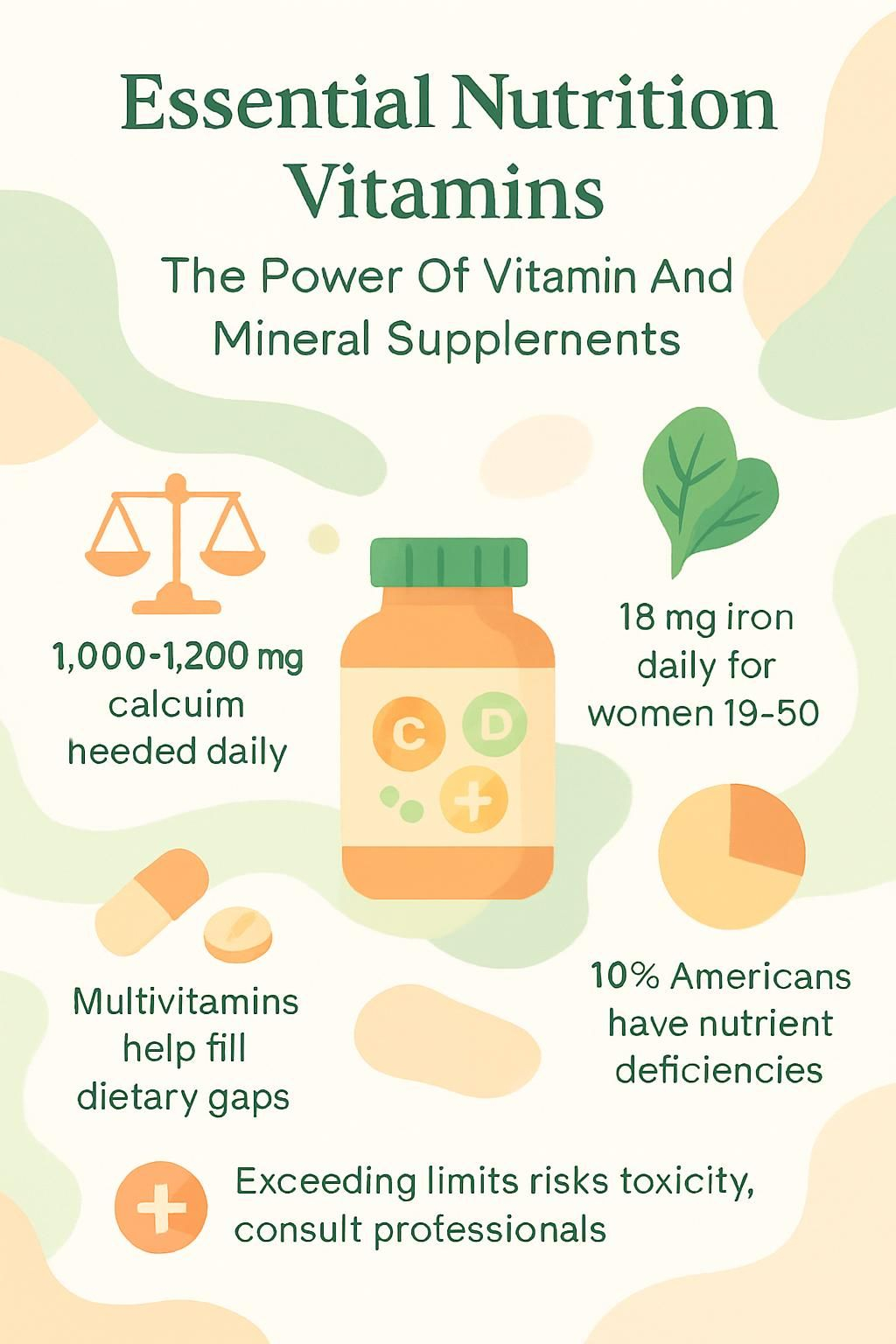Essential Nutrition Vitamins: The Power Of Vitamin And Mineral Supplements
Our Nutrition Assistant AI Suite will transform your body. You will lose fat, get toned, and build muscle. Gain confidence and optimal health.
You may wonder which vitamin and mineral matter most, or if a supplement fits your diet. Your body needs these micronutrients, meaning nutrients required in small amounts, to function well each day. Many people do not get enough through food alone, so smart use of dietary supplements can help.
This guide explains how key nutrients like vitamin C, calcium, and magnesium support your health. You will also learn simple steps to choose safe products and close nutrition gaps.
Key Takeaways
- Your body needs vitamins and minerals such as vitamin C, vitamin D, vitamin B12, calcium, iron, and magnesium for immunity, bones, and daily cell function.
- Most adults need 1,000 to 1,200 mg of calcium daily. Women 19 to 50 need 18 mg of iron each day to limit deficiency.
- About 10% of Americans have at least one vitamin or mineral deficiency, based on recent CDC data.
- Supplements, including multivitamins, can help fill gaps for people with limited diets or higher needs such as pregnant women or older adults.
- Going past upper limits, for example more than 3,000 mcg vitamin A per day, can cause harm. Review labels and check with a healthcare professional before use.

What Are Vitamins and Minerals? Key Roles in Health

Vitamins and minerals are tiny helpers with big jobs. Knowing how these nutrients work makes daily food choices easier and more effective.
What are vitamins and why do we need them?
Vitamins are compounds your body needs in small amounts to stay healthy. Each one has a role, such as supporting immunity, protecting vision, helping skin, and aiding wound healing. Fat-soluble vitamins, vitamins A, D, E, and K, can build up in body tissues. Water-soluble vitamins, vitamin C and the B vitamins, leave in urine if you take more than you need.
Too little vitamin C can cause scurvy, a disease with bleeding gums and weakness. Too little vitamin D can cause rickets in children. Because your body cannot make most vitamins, you meet needs through a varied diet or dietary supplements when food falls short.
Take care of your body; it’s the only place you have to live. – Jim Rohn
What are minerals and why are they important?
Minerals are elements your body needs for core functions. Major minerals, like calcium, sodium, and potassium, support bones, nerves, muscles, and fluid balance. Trace minerals, including zinc, copper, and iodine, guide metabolism and hormones. Iodine helps your thyroid make hormones; zinc supports immune function and wound repair.
You get minerals from foods such as dairy, whole grains, fruits, leafy vegetables, beans, fish, and meat. Needs change with age and life stage based on Dietary Reference Intakes, often called DRIs.
How do micronutrients affect daily health?
Micronutrients power critical processes each day. Vitamin K supports blood clotting. Iron helps red blood cells carry oxygen. Others affect immunity, hormones, and nerve signals.
Missing enough can lead to weak bones, iron deficiency anemia, high blood pressure from low potassium, or slow healing with low vitamin C. Experts set a Recommended Dietary Allowance, RDA, for most nutrients. If research is limited, an Adequate Intake, AI, guides you toward meeting needs through a balanced diet rich in fruits and vegetables.
Essential Vitamins and Their Functions
Each essential vitamin works in a specific way to protect tissues, organs, and cells. Think of them as a small toolkit that keeps your body running smoothly.
What does Vitamin A do for the body?
Vitamin A supports night vision and helps your eyes adjust to light. It also backs immunity, skin integrity, and reproduction. Too little can lead to night blindness, dry eyes, more infections, or skin problems.
Targets: women about 700 mcg per day, men about 900 mcg. The upper limit is 3,000 mcg per day. Sources include carrots, sweet potatoes, spinach, kale, eggs, liver, and fortified dairy. Regular intake supports normal cell membranes and growth.
What are the benefits of the B Vitamins (B1, B2, B3, B6, B12)?
B vitamins help your body turn carbohydrates, fats, and protein into energy. The body stores only small amounts of most B vitamins, except vitamin B12 which your liver can store. Thiamin, B1, supports nerve function. Riboflavin, B2, supports skin and eyes. Niacin, B3, supports digestion and helps with cholesterol. Vitamin B6 helps make red blood cells and supports brain function. Vitamin B12 supports DNA production and prevents certain types of anemia.
- Thiamin: women 1.1 mg, men 1.2 mg per day
- Riboflavin: about 1.1 to 1.3 mg per day
- Niacin: 14 to 16 mg per day, upper limit 35 mg
- Vitamin B6: generally 1.3 to 1.7 mg per day, upper limit 100 mg
- Vitamin B12: 2.4 mcg per day
Falling short can cause fatigue, anemia, nerve issues, and, during pregnancy, birth defects if folate is low.
Why is Vitamin C important for health?
Vitamin C helps your body make collagen, a protein that supports skin, blood vessels, and wound healing. It also protects cells as an antioxidant and boosts iron absorption from plant foods like beans and spinach.
Aim for 75 mg per day for women and 90 mg for men. Smokers need 35 mg more. Severe lack causes scurvy. Since vitamin C is water soluble, extra amounts usually leave in urine, so toxicity is rare.
How does Vitamin D support the body?
Vitamin D helps your body absorb calcium. Without adequate vitamin D, bones weaken, raising the risk of osteoporosis in adults and rickets in children. Most adults 19 to 70 need 15 mcg, 600 IU, per day. Adults 71 and older need 20 mcg, 800 IU.
Food provides some vitamin D, such as fatty fish and fortified milk. Sunlight triggers your skin to make it. Vitamin D also supports muscles and immunity. If you get little sun or do not eat fortified foods, a supplement may help.
What role does Vitamin E play in wellness?
Vitamin E is an antioxidant that helps protect cell membranes from damage. It supports immunity and skin health, and it aids normal cell function. Adults need about 15 mg per day. Doses above 1,000 mg can be unsafe.
Find vitamin E in nuts, seeds, plant oils, leafy greens, whole grains, eggs, and some meats. A balanced diet usually meets the daily need.
Why do we need Vitamin K?
Vitamin K helps your blood clot after a cut. It also works with calcium to support strong bones. Adult women need about 90 mcg per day, and men need about 120 mcg.
Deficiency is uncommon, but it can occur with fat absorption problems or certain medicines. Leafy greens are reliable sources. Some supplements include vitamin K to help fill gaps.
Essential Minerals and Their Functions
Minerals are building blocks for bones, nerves, and muscles. They keep daily systems steady, from a steady heartbeat to fluid balance.
How does calcium benefit the body?
Calcium strengthens bones and teeth. It supports muscle movement, heart rhythm, nerve signaling, and normal blood clotting. Women 19 to 50 need about 1,000 mg daily. Women 51 and older need 1,200 mg. Men up to 70 need 1,000 mg; men 71 and older need 1,200 mg.
The upper limit is 2,500 mg for most adults, and 2,000 mg for older adults. Get calcium from milk, yogurt, fortified plant milks, leafy greens, almonds, and canned fish with bones such as sardines.
Why is iron important for health?
Iron helps make hemoglobin, the protein in red blood cells that carries oxygen. Low iron can cause tiredness and weakness because your cells lack oxygen. It also affects immunity.
Women 19 to 50 need 18 mg daily. Women 51 and older need 8 mg. Men generally need 8 mg. The upper limit is 45 mg. Good sources include meat, beans, lentils, and leafy greens.
What are the functions of zinc?
Zinc supports immune function, cell growth, and wound healing. It also helps your body move vitamin A through the bloodstream.
Women need 8 mg per day, men need 11 mg. The upper limit is 40 mg. Foods rich in zinc include beef, poultry, oysters, dairy, whole grains, and fortified cereals.
How does magnesium support bodily functions?
Magnesium helps regulate blood pressure, aids glucose metabolism, and supports muscle and nerve function. It also assists more than 300 enzymes that drive normal body processes.
Sources include nuts, legumes, leafy greens, whole grains, seafood, and dark chocolate. Women 19 to 30 need 310 mg per day, 31 and older need 320 mg. Men 19 to 30 need 400 mg, 31 and older need 420 mg. The upper limit from supplements is 350 mg per day.
Why is potassium essential?
Potassium helps keep your heartbeat regular and your nerves and muscles working. It also balances sodium to support healthy blood pressure and proper fluid levels inside cells.
Daily targets: 2,600 mg for women and 3,400 mg for men. Good sources include bananas, apricots, potatoes, mushrooms, spinach, beans, and nuts. There is no upper limit from foods for healthy adults, but high-dose supplements can be risky without medical guidance.
What role does sodium play in the body?
Sodium supports fluid balance and nerve signaling, which helps muscles contract and relax. Most people get more than they need from salt and processed foods.
General advice is to aim for less than 2,300 mg per day. Some people benefit from 1,500 mg. Lowering sodium can improve blood pressure and reduce bloating.
Why is iodine necessary for health?
Iodine helps your thyroid make hormones that guide growth, metabolism, and energy use. Adults need 150 mcg per day. The upper limit is 1,100 mcg.
Sources include dairy, seafood, seaweed, eggs, iodized salt, and some breads made with iodized ingredients. Including these foods often covers daily needs.
Common Food Sources of Vitamins and Minerals
Your plate can supply a wide range of micronutrients. Mix colors and food groups to cover more bases.
Which fruits and vegetables provide essential nutrients?
Carrots and spinach provide vitamin A for vision and immunity. Citrus fruits offer vitamin C for skin and healing. Bananas, apricots, mushrooms, and spinach supply potassium for muscle function.
Kale adds folate. Bell peppers supply vitamins A and C. Strawberries bring vitamin C. Building variety into meals helps you get enough without relying only on pills.
How do dairy products contribute vitamins and minerals?
Dairy foods such as milk, yogurt, and cheese offer calcium that your body absorbs well. Adults need 1,000 to 1,200 mg per day for bone and muscle function.
Dairy also supplies iodine for thyroid health and phosphorus, about 700 mg per day is the target, for bone and teeth structure. Fortified milk can add vitamin D, which helps your body absorb calcium.
What whole grains are rich in micronutrients?
Whole-wheat bread and pasta, plus brown rice, provide B vitamins like thiamin and folate. These vitamins help turn food into energy and support cell health. Whole grains also contribute magnesium for bones and muscles.
Enriched grains often include folic acid to prevent deficiency. Phosphorus, manganese, and selenium appear in many whole grains and support enzyme action and tissue health.
Which meats, fish, and poultry supply vitamins and minerals?
Lean meats such as beef and pork provide iron and zinc for oxygen transport and immune strength. Red meat offers vitamin B12 for nerves and blood health.
Chicken and turkey deliver protein, niacin, and vitamin B6. Fatty fish like salmon and mackerel contain vitamin D and omega 3 fats that support heart health. Oysters are rich in zinc and selenium.
How do legumes and beans support nutrition?
Beans and lentils provide iron, magnesium, zinc, manganese, and protein. These nutrients support growth, nerves, and enzyme activity. Fiber in legumes aids digestion and helps you feel full longer.
Legumes also offer choline and B vitamins such as biotin and pantothenic acid, which help your body use fats for energy.
Benefits of Vitamin and Mineral Supplements
Supplements can help close gaps when your diet falls short. Think of them as a safety net, not a replacement for a balanced plate.
How can supplements fill nutritional gaps?
If your diet lacks variety, or you have restrictions, a supplement can help. Multivitamins supply several vitamins and minerals at once. People who eat little or no meat may need iron or vitamin B12. Pregnant women often need extra folate to protect the developing brain and spine.
Older adults may absorb less vitamin D or calcium. A vitamin D supplement can help the body use calcium for bone health. Those who avoid dairy and seafood might need iodine for thyroid function. CDC data suggest roughly 1 in 10 Americans has at least one deficiency, so targeted support can be useful.
Do supplements support immune health?
Vitamin C supports white blood cell production. Zinc helps these cells grow and function. Vitamin A supports tissue barriers, and vitamin D helps regulate immune responses, especially when levels are low.
| Nutrient | Primary Function | Potential Supplement Benefit |
|---|---|---|
| Vitamin C | Supports white blood cells | May reduce severity and duration of colds |
| Zinc | Aids cell growth and repair | May support immune response |
| Vitamin A | Maintains surface tissues | Supports barrier defenses |
| Vitamin D | Modulates immune activity | Helps those with low levels |
Supplements can help when food intake is low, but they should not replace a balanced diet rich in fruits, vegetables, whole grains, and quality protein.
Can supplements enhance bone and muscle strength?
Calcium and vitamin D work together to maintain strong bones and muscles. Vitamin D helps your body absorb calcium. This pairing is often recommended for older adults or anyone who struggles to meet needs through diet alone. Magnesium also supports bone structure and helps with energy production.
Research links adequate intake with better bone density in adults at risk for fractures. Stick to recommended doses to avoid side effects.
How do supplements boost energy levels?
B vitamins, especially B1, B2, B3, B6, and B12, help your cells turn food into energy. If you are low, a balanced B complex may improve tiredness over several weeks. Iron supports hemoglobin, which carries oxygen. If you have iron deficiency, treating it often improves energy.
Multivitamins can cover minor gaps if your diet is limited or if certain medicines affect absorption. Use label-guided doses and check with your clinician if you have a medical condition.
What supplements promote healthy skin and hair?
Vitamin E and vitamin A act as antioxidants that help protect skin cells from damage. Biotin, vitamin B7, supports keratin formation for hair and nails. Zinc helps repair tissue and supports a strong skin barrier.
If your diet lacks nuts, seeds, leafy greens, or seafood, a targeted product may help. Keep doses within safe limits and monitor changes over several weeks.
Risks and Considerations of Supplementation
Choose doses that match your needs. Too much can harm health, and some products can interact with medicines.
What are the risks of overdose and toxicity?
Each nutrient has a tolerable upper limit. Vitamin A above 3,000 mcg per day can harm the liver and can cause birth defects during pregnancy. Vitamin D above 100 mcg, 4,000 IU, may cause nausea, weakness, or organ issues over time.
Very high vitamin C, over 2,000 mg per day, can cause stomach upset and may raise kidney stone risk in some people. Iron above 45 mg per day can cause severe stomach problems and can be dangerous. High sodium intake raises blood pressure for many people. Long term, stick to safe ranges and check labels.
Are supplements as effective as natural food sources?
Supplements cannot match everything in whole foods. Fruits, vegetables, and whole grains provide fiber, healthy fats, and beneficial plant compounds that work together. Some nutrients absorb better from food because of these natural partners.
Use supplements to correct clear gaps or higher needs. Aim to meet most needs with a balanced diet.
When should you consult a healthcare professional?
Talk with a healthcare professional if you are pregnant, older, managing a health condition, or taking prescription medicines. Some supplements change how drugs work, and some drugs change how you absorb nutrients.
Ask about blood tests if you suspect a deficiency. A short visit can help you choose the right dose and avoid interactions. This content is for education and does not replace medical advice.
Choosing the Right Supplement
Picking a safe product starts with the label. A few checks can protect your health and your budget.
How do you read and understand supplement labels?
First, look at the serving size. Then check the amount of each nutrient listed in micrograms, mcg, milligrams, mg, or International Units, IU. Compare these amounts to the Recommended Dietary Allowance, RDA, the Adequate Intake, AI, and the Upper Limit, UL.
Labels also show % Daily Value, %DV, based on a 2,000 calorie diet. For example, vitamin D has an RDA of 15 mcg for most teens and adults, and a UL of 100 mcg. If your multivitamin gives over 100% DV for vitamin C but only 20% for calcium, plan foods rich in calcium instead of more pills.
How to assess your dietary supplement needs?
Match products to your age, gender, diet pattern, and health status. Pregnant women need more folic acid and iron. People who eat no animal foods often need vitamin B12. Adults with limited sun exposure may need vitamin D.
Use DRI values as your guide. If you have absorption problems or special needs, ask your clinician for testing and a personal plan.
What should you look for in reputable supplement brands?
Choose brands that follow FDA labeling rules and align with guidance from the NIH Office of Dietary Supplements. Look for third-party seals such as USP Verified or NSF International. These programs test quality and purity.
Pick products that list every ingredient and amount, including fillers. Reliable companies provide clear contact details and responsive customer support.
Special Cases for Supplementation
Certain life stages raise your needs. Targeted support can protect health during pregnancy, aging, and athletic training.
Why are prenatal vitamins important during pregnancy?
Prenatal vitamins supply key nutrients for fetal growth. Folate helps prevent birth defects of the brain and spine. Aim for at least 400 mcg per day from supplements and fortified foods. The upper limit is 1,000 mcg for folic acid from fortified foods and supplements.
Iron needs rise to 27 mg per day during pregnancy to support increased blood volume and oxygen delivery. Many women cannot meet this with diet alone, so prenatal vitamins help reduce anemia risk.
How do supplements support aging and bone health?
As you age, your body absorbs less calcium and vitamin D. Women over 51 need 1,200 mg calcium per day. Adults 71 and older need 20 mcg, 800 IU, vitamin D per day.
Meeting these targets is hard for many older adults. Calcium and vitamin D supplements can slow bone loss and reduce fracture risk when used with weight-bearing exercise and a nutrient-dense diet.
What supplements aid athletic performance and recovery?
Magnesium supports muscle function, energy production, and nerve signaling. Potassium helps maintain fluid balance and reduces the risk of muscle cramps after intense activity. Some athletes also use protein powder, creatine, or branched-chain amino acids under professional guidance.
Use only what you need, and avoid high doses that add no benefit. Check trusted fact sheets from the NIH Office of Dietary Supplements for sports-focused guidance.
Conclusion
Understanding vitamins and minerals helps you make better daily choices. Food comes first, then the right supplement can help when you do not get enough from diet alone. A quality multivitamin or a single nutrient, such as vitamin C or calcium, may be useful for specific needs.
Read labels, match doses to your goals, and ask a healthcare professional if you take medicines or manage a condition. Small, steady steps protect your health, support energy, and keep you feeling your best. Sources: CDC and NIH Office of Dietary Supplements.
FAQs
1. What are essential nutrition vitamins and why do we need them?
Essential nutrition vitamins, such as vitamin C, vitamin D, and B-complex nutrients, support body functions like immune defense, energy production, and bone strength. Scientific studies show that lacking these nutrients can lead to health problems including fatigue or weakened immunity.
2. How do mineral supplements help maintain good health?
Mineral supplements provide key elements like calcium for strong bones and iron for healthy blood cells. Data from the National Institutes of Health indicate that many people do not get enough minerals through food alone; supplements can fill these gaps when needed.
3. Can taking too many vitamin or mineral supplements be harmful?
Taking more than the recommended amount of certain vitamins or minerals may cause side effects such as nausea or organ stress. For example, high doses of vitamin A have been linked to liver issues in clinical research. Always follow dosage guidelines provided by healthcare professionals.
4. Do you need a supplement if you eat a balanced diet?
Most people who eat varied meals with fruits, vegetables, grains, protein foods, and dairy products receive enough essential nutrients without extra pills or powders. However some groups like older adults or pregnant women may benefit from targeted supplementation based on medical advice.
Summary: Essential nutrition vitamins and minerals play vital roles in keeping our bodies healthy according to scientific evidence. Supplements can help meet needs when diets fall short but should be used carefully under guidance from trusted sources.







